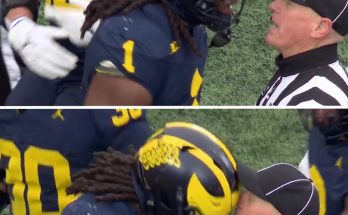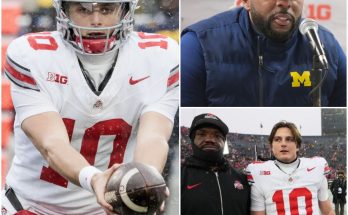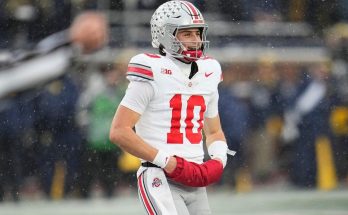Texas head coach Steve Sarkisian didn’t mince words after the Longhorns’ hard-fought showdown with Florida on Saturday night. Standing at the postgame podium, his voice carried the mix of pride and grit that defines the heart of Texas football. “He battled his tail off,” Sarkisian said of quarterback Arch Manning, a simple statement that spoke volumes about a young player’s resilience in the face of immense pressure, physical exhaustion, and the weight of expectation that only a name like “Manning” can bring.
The game itself was a battle of will and heart more than anything else. Florida came into the matchup hungry, ready to spoil Texas’ momentum and challenge their identity as a national contender. But amid the noise, the hostile crowd, and the constant defensive pressure, Arch Manning showed something deeper than talent — he showed toughness, both mental and physical, the kind that coaches can’t teach but can only hope to see emerge in the fire of competition. Sarkisian saw it unfold firsthand.
From the opening snap, Florida’s defense came after Manning relentlessly. Blitzes, disguised coverages, delayed pressures — everything in the Gators’ playbook was designed to disrupt the young quarterback’s rhythm. For much of the first quarter, it worked. Manning was sacked early, pressured often, and hit repeatedly. But every time he got up, dusted himself off, and jogged back into the huddle, the sideline could sense something shift. The pain didn’t rattle him; it ignited him.
That’s what Sarkisian meant when he said, “He battled his tail off.” It wasn’t about the box score, though Manning’s stats were solid. It was about composure under fire, about leading with resolve when the pocket collapsed, and about staying steady even when the game refused to give him any breaks. Texas fans saw it in his eyes — the determination that comes from knowing your team is counting on you to stand tall no matter how many times you get knocked down.
For all the attention that has followed Arch since his high school days, this game against Florida may have been the one that truly revealed who he is at his core. Yes, he’s a Manning — nephew of Peyton and Eli, grandson of Archie — but on Saturday, he didn’t play like someone carrying a family legacy. He played like a fighter trying to build his own.
Sarkisian has been vocal about the patience and preparation that have gone into Manning’s development. From the moment Arch stepped on campus, the plan wasn’t to rush him into stardom but to let him grow into it. The Texas offense is intricate and demanding, requiring a quarterback who can process quickly, adjust protections, and make big-time throws under duress. Against Florida, those lessons were tested in real time, and Manning responded with the poise of a veteran.
There were moments when it would have been easy to fold. Late in the second quarter, he took a brutal hit after releasing a pass that just missed a touchdown. The crowd gasped as he stayed down for a few seconds, clutching his ribs. Trainers rushed to him, and for a brief moment, the Texas sideline fell silent. But then, as if refusing to let pain define him, Arch got up, waved off the medical staff, and jogged back toward the huddle. The next play, he completed a crucial third-down strike that kept the drive alive.
That single sequence — hit, pain, recovery, execution — encapsulated everything Sarkisian saw and meant when he spoke about toughness. “That’s leadership,” Sarkisian said later. “You can’t fake that kind of response. Your teammates see it, and it inspires them.”
Indeed, it did. Texas’ offensive line, which had struggled early against Florida’s aggressive front, began to play with more fire. Receivers fought harder for yards after the catch. Even the defense fed off the energy, rallying around their young quarterback’s determination. In football, toughness is contagious. Manning’s resolve spread across the field, turning what looked like a potential collapse into a second-half resurgence.
By the fourth quarter, Manning had found his rhythm. The timing with his receivers sharpened, and his confidence in the pocket returned. He made throws into tight windows, read the defense like a chess master, and led two long scoring drives that kept Texas in contention until the very end. Though the final score favored Florida, Sarkisian wasn’t concerned with the loss as much as the character revealed through the fight.
“We didn’t get the result we wanted tonight,” he said, “but I’m proud of the way this team battled, especially Arch. That’s what you want to see in your quarterback — toughness, leadership, and belief in his guys. He gave us everything he had.”
For Arch, the game was more than a test of skill — it was a test of identity. College football fans have watched him grow up in the shadow of legendary relatives, and every snap he takes is scrutinized through the lens of legacy. But this game may have been the moment where that conversation began to shift. This wasn’t about being the next Manning; it was about being the first Arch.



